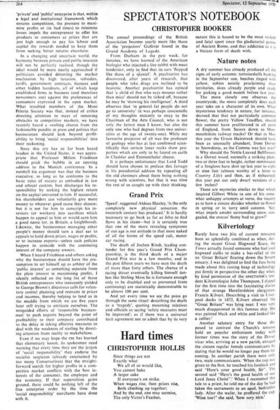SPECTATOR'S NOTEBOOK
CHRISTOPHER BOOKER
The annual proceedings of the British Association become yearly more like those of the 'projectors' Gulliver found in the Grand Academy of Lagado.
From Durham in the past week, for instance, we have learned of the American biologist who injected a live rabbit with meat tenderiser, only to find that its ears 'flopped like those of a spaniel'. A psychiatrist has discovered, after years of research, that people who take , drugs are inclined to be neurotic. Another psychiatrist has opined that 'a child of five who says mouses rather than mice' should not be ticked off, because he may be 'showing his intelligence'. A third observes that 'in general fat people do not go to university' (it was perhaps unscientific of my thoughts instantly to stray to the Chairman of the Arts Council, who is not only the fattest man I know, but also the only one who had degrees from two univer- sities at the age of twenty-one). While my favourite projector of all was the professor of geology who has at last confirmed scien- tifically that certain lunar rocks show pro- perties which are only to be found on earth in Cheddar and Emmenthaler cheese.
It is perhaps unfortunate that Lord Todd should have chosen to preface this farrago in his presidential address by repeating all the old chestnuts about there being nothing wrong with scientists, but that it was time the rest of us caught up with their thinking.
Grand Prix
'Speed', suggested Aldous Huxley, 'is the only completely new physical -sensation_ the twentieth century has produced.' It is hardly necessary to go back as far as Jehu to find flaws in his claim—but it is certainly true that one of the more revealing symptoms of our age is our attitude to that most naked of all the forms of the speed cult, motor car racing.
The death of Jochen Rindt, leading con- tender for this year's Grand Prix Cham- pionship, is the third death of a major Grand Prix star in a few months; and in the past fifteen years we have seen the death of more than forty others. The chance of a racing driver eventually killing himself (un- less like Stirling Moss he is fortunate enough only to be disabled and so prevented from continuing) are statistically demonstrable to be almost 100 per cent.
And yet every time we see the press go through the same ritual: describing the death as a 'tragedy', quoting mourning relatives and officials as saying 'safety measures must be improved'; as if there was a universal tacit agreement not to admit that by its very nature this is bound to be the most violent and fatal sport since the gladiatorial games of Ancient Rome, and that addiction to it is a blatant form of death wish.
Nature notes
A dry summer has already produced all the signs of early autumn: tortoiseshells basking in the September sun, beeches tinged with yellow, robins noisily proclaiming their territories, sloes already purple and ready -for picking a good month before last year.
The more closely one observes the countryside, the more completely does each year take on a character of its own. What mysterious tendency in nature, for instance, decreed that that not particularly common flower, the pretty Yellow Toadflax, should this summer have proliferated in all parts of -England, from Sussex down to Mon- mouthshire railway tracks? Or that in May this year the Green Hairstreak should have been as unusually abundant, from Dorset to Snowdonia, as the Comma was last year?
Why should the Nettle-Leaved Bellflowers in a Dorset wood, normally a striking plant, two or three feet in height, rather reminiscent of a foxglove have shot up last year to eight or nine feet (almost worthy of a letter to Country Life) and then, as- if exhausted, this year put out only dwarf versions of a few inches?
These are mysteries similar to that which inspired Gilbert White to one of his some- what unhappy attempts at verse, the inquiry as to how a crocus decides whether to flower in spring or to tarry until autumn. 'Say, what impels amidst surrounding snow, con- gealed, the crocus' flamy bud to grow?'
Kilvertology
Rarely have two _bits of current nonsense been so splendidly. combined as when, dur- ing the recent Great Hogweed Scare, the Times aotually found someone who had used hogweed stalks to make a bas-relief of the ss 'Great Britain' floating down the Severn estuary. I was delighted to find the fuss being made about this rusting heap of technology put firmly in perspective the other day when, by kind permission of the SPECTATOR'S resi- dent Kilvertologist John Thompson, I dipped for the first time into the fascinating diaries of that strange Herefordshire clergyman, Francis Kilvert. Describing a visit to Liver- pool docks in 1872, Kilvert observed `the "Great Britain" was lying near. I was very much disappointed in this famous ship. She was painted black and white and looked like a collier.'
Another salutary entry for those dis- posed to contrast the Church's tenuous hold on popular enthusiasm today with former times was the story of the Dorset vicar who, arriving at a new parish, enraged the sixteen regular female communicants by stating that he would no longer pay them for coming. In another parish there were only two, male communicants. 'When the cup was given to the first, he touched his forelock and said "Here's your good health, Sir". The second said "Here's the good health of our Lord Jesus Christ".' When I recounted this tale to a priest, he told me of the day he had taken the sacraments to an aged, bedridden lady. After the wafer, he proffered the cup• `Wine tool' she said, 'how very nice.














































 Previous page
Previous page